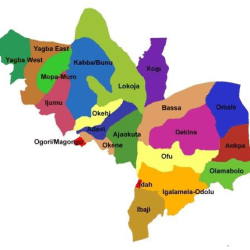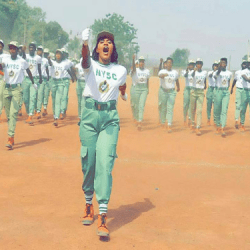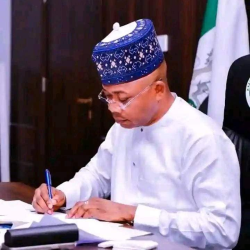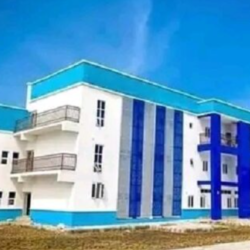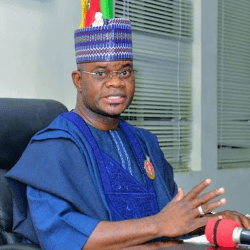Kogi State was carved out of the old Kwara and Benue States. The people f Kogi had shared a common history and had co-existed as one polity for a period of over seven decades before being severed by the 1976 States creation exercise.
The creation of the State on the 27th August 1991 was a dream fulfilled and one which seeks to put the State on the threshold of rapid socio-economic transformation.
The area which today forms Kogi State was a colonial formation then known as Kabba Province which had suffered neglect since independence. It was, therefore, the quest for rapid socio-economic development of the area that informed the decision of the Babangida government in 1991 to create along with eight others, a State out of both Kwara and Benue bringing together families who had been separated by the 1976 states creation exercise into a happy reunion.
Kogi State is made up of the Igala, Kabba, Ebira and Kogi Division of the former Kabba Province. It is the most centrally located State in the country and shares boundaries with the Plateau, Niger and the Federal Capital Territory (FCT), to the North, Benue and the Anambra States to the East and on the West, it is bordered by Ondo, Kwara, Edo and Enugu States. It is in short, the gateway State with very rich cultural values, great natural endowments and infinite stretches of arable land.
The state capital, Lokoja is an ancient historical town which once served as the colonial administrative headquarters of Nigeria. It is located on the intersecting point of longitude 70 49’N and latitude 60 44’E on the map of Nigeria. Lokoja town is situated on the slope of a range of hills, Mount Patti. The town in its growth runs down the scope and expands into the Niger River valley. It is located at the confluence of the rivers Niger and Benue. The Kogi State Capital, fast turning into a modern city is bounded on the North and East by the River Niger and on the West by the wooded heights of Mount Patti and South by Ajaokuta. It occupies an area of between twenty and thirty kilometers. The state capital, like most others in the country, plays a dual role since it is the administrative headquarters of the Kogi Local Government Area.
In spite of the difficulties in the definition of the Niger-Benue confluence area, there seems to be a general agreement on the various peoples and cultures that inhabit the areas which now form Kogi State. The peopling of the area has been studied in the context of evidence derived from archaeology, physical anthropology, and historical linguistics. It has in this area dates back to the Stone Age.
Lokoja now wears the necessary paraphernalia of a state capital: Government House, State Secretariat, Federal establishments, institutions of higher learning, stadia, industries, increased population and a number of other attributes of a state capital.
More on Kogi State
Kogi State is one of the 36 states of Nigeria, located in the north-central region of the country.


It is home to the confluence of the Niger and Benue rivers which form the largest inland delta in Africa. It is also blessed with diverse mineral deposits, such as coal, iron ore, limestone, gold, and kaolin.



It was created in 1991 from parts of Kwara State and Benue State, and it is bordered by Niger, Federal Capital Territory, Nassarawa, Benue, Enugu, Anambra, Edo, Ondo, Ekiti, Kwara and Niger states.

The state capital is Lokoja, which is also the confluence of the Niger and Benue rivers, making it a historically significant location for trade and commerce.

It has a population of about 4.5 million people, according to the 2006 census, and it is ethnically diverse with over 50 indigenous groups, including Igala, Ebira, Okun, Bassa, Nupe and others.
Kogi is divided into 21 local government areas (LGAs), and it has three senatorial districts: Kogi East, Kogi West and Kogi Central.
List of 21 Local Government Areas in Kogi State
- Adavi
- Ajaokuta
- Ankpa
- Bassa
- Dekina
- Ibaji
- Idah
- Igalamela-Odolu
- Ijumu
- Kabba/Bunu
- Kogi
- Lokoja
- Mopa-Muro
- Ofu
- Ogori/Mangongo
- Okehi
- Okene
- Olamabolo
- Omala
- Yagba East
- Yagba West

Tourist attractions include Lord Lugard Residence, the Mount Patti Hill, the Confluence Beach Park, the Awo Tunnel, the Ogidi-Ijumu Rock Formation and the Iron of Liberty Monument.
The state is known for its cultural diversity and festivals such as the Igala Cultural Festival, the Ebira Carnival, the Okun Day Celebration and the Bassa Nge Festival.
Kogi festivals include the Igala Masquerade Festival and the Ebira Carnival.

The Igala Masquerade Festival is an annual event that showcases the rich traditions and costumes of the Igala people. The festival features different types of masquerades that represent different aspects of Igala culture and mythology.

The Ebira Carnival is another colorful celebration that involves music, dance, and art. The carnival showcases the creativity and talent of the Ebira people, who are known for their pottery, weaving, and carving skills.
Kogi is a state that offers a lot of opportunities for adventure, learning, and fun. It is a place where you can experience the beauty and diversity of Nigeria’s culture and nature.

